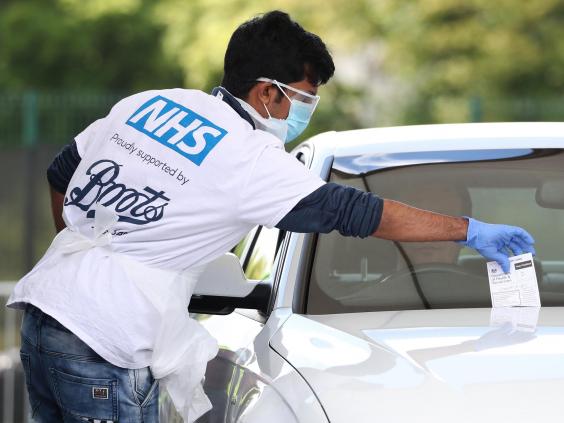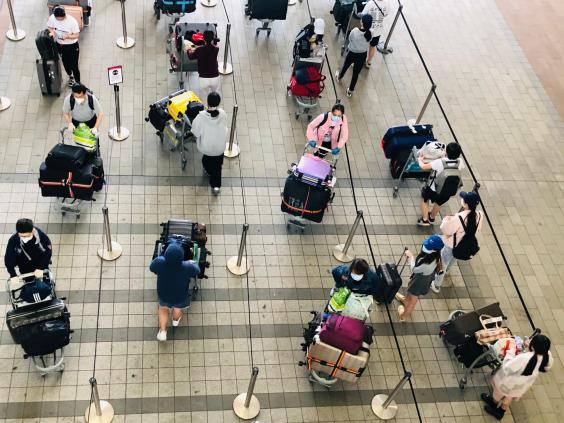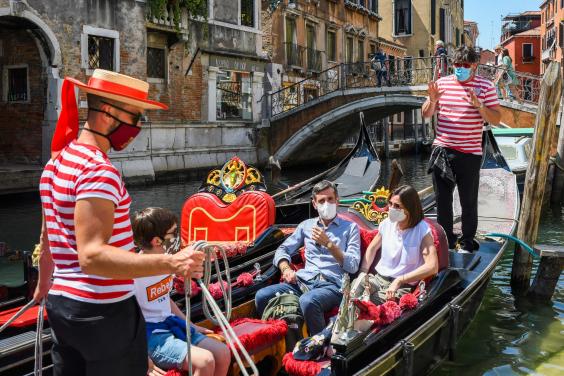What happens if a country is put on the red list while I’m there?
Simon Calder answers your questions on the traffic light system, travelling for funerals, Heathrow queues and wedding deposits


Q What happens if I go to an “amber” country and whilst I’m there Boris makes it a “red” country before I return?
“REB7” via Twitter
A At present non-essential journeys beyond the UK are currently illegal – with a £5,000 penalty for even turning up at an airport and hoping to go on holiday.
But that draconian measure may be eased soon: the government’s roadmap to recovery holds out some hope that travellers from England, at least, could be able to leave the country on 17 May. Or you may be travelling for one of the reasons that brings exemption from the no-go rule: employment, education or urgent family matters.
Your concern, understandably, is what awaits you on your return. As you correctly observe, the UK already has a “traffic light” system for arrivals from abroad. The red category has just increased from 35 countries to 39 with the addition of Kenya, Pakistan, Bangladesh and the Philippines. Anyone from those countries requires 11 nights of hotel quarantine at a cost of £1,750.
Read more:
At the other extreme, with effectively no restrictions, is the single country on the green list: Ireland.
In between, the remaining 150 or so nations are amber. They require 10 days of self-isolation at home, though with the chance to release early in England if you pay for another test after five days. Many people will put up with this inconvenience – but may not have the stomach, or the money, for hotel quarantine.
There is no guaranteed way of knowing whether your destination will suddenly be added to the red list while you are away.
But the one positive element from Good Friday’s expansion of the red list was that the government gave a week’s notice to people to get back from Asia and East Africa before the hotel quarantine obligation kicked in. That is far better than the few hours’ warning given to holidaymakers in Spain last July, when the whole country was placed on the list of places from which returning travellers must self-isolate for two weeks.
A week’s warning should give you, and many others, the chance to get back without triggering an expensive and uncomfortable stay in a hotel on Heathrow airport’s “isolation row”.

Q My husband needs to get to Sweden for his father’s funeral. We live near Edinburgh. It is not at all clear how we can organise this in terms of testing, quarantine etc. We need to keep cost as low as possible. Can you help?
Name supplied
A My heart goes out to people for whom sad family events are made even tougher by the extremely tough travel restrictions currently in place because of the coronavirus pandemic. Grief is compounded and intensified by a tangle of rules that are intended to reduce risk.
Let me take you stage-by-stage through what is required. First, a flight to Sweden. Ideally, you would book a direct flight from the UK rather than changing planes, because an en-route stop can add to complexity, but at present, there are no regular services to Stockholm or elsewhere in Sweden. The obvious solution is to travel on KLM via Amsterdam – which currently allows transit from the UK to a third country for travellers who have a negative Covid-19 test taken within 72 hours. Since Sweden will require a negative coronavirus test taken within 48 hours, the same certificate can be used for both.
Edinburgh airport has a testing centre onsite with PCR tests aimed to be delivered by 10pm the day after the test – so a test at, say, 5pm two days before the travel date should be good for entry up to 6pm, Swedish time, on the day of arrival. The cost is £99 (£80 for airline passengers).
Brexit and the coronavirus crisis have made the procedure for entering Sweden much more difficult, with a general prohibition on UK citizens. This will be waived for critical family events. Contact the Swedish consulate in Edinburgh (Edinburgh@SwedishConsulate.eu) to check the evidence that will be required for your husband to enter the country for the funeral.
Returning home presents an issue. The Scottish government makes hotel quarantine mandatory for all arrivals from abroad (apart from Ireland), at a cost of £1,750 for 11 nights. Perhaps understandably, only a handful of people each day are arriving in Scotland direct from abroad.
Many people who live in Scotland are avoiding this by flying into England and then travelling north, for 10 days of self-isolation at home. The evidence I have seen indicates Newcastle and Manchester are popular arrival points for Scots. It is not illegal to follow that course of action but your husband must fully quarantine at home on his return.

Q My sister arrives at Heathrow tomorrow. What are the immigration queues likely to be following reports of three-hour waits in previous weeks?
KTB
A Three hours? Last month Heathrow airport’s chief operating officer, Emma Gilthorpe, expressed quiet fury at the passenger experience. She told the Home Affairs Committee: “We have had queues extending out to nearly six hours on occasion.”
I have never seen a senior airport executive so critical of the UK Border Force. While there have historically been very long queues on peak days for arrivals from countries from which the UK requires a visa, the lines at Heathrow in late February and early March were very long for all nationalities. During a global pandemic it was very concerning for the people forced to queue and the staff responsible for looking after them.
I hope I am correct in predicting your sister will be through in an hour or less. My sense is that the queues for passport control at the UK’s busiest airport are now much shorter than they have been. Partly that is because the UK’s ban on overseas leisure travel means that the numbers coming in have dwindled still further (to 1966 levels, according to Heathrow’s most recent traffic figures) and partly because the complex rules for arriving in the UK are better known.
The men and women of the UK Border Force were having to deal with loads of people who had not got the requisite pre-booked coronavirus tests in place. Robust words have been exchanged with the airlines that flew them in, to ensure that all the formalities are properly in place by the time the traveller arrives in the UK.
Now that the system is better understood, the time taken for processing the typical traveller has dropped from a peak of around 15 minutes, and the queues have shrunk accordingly. Do let me know if my response turns out to be mistaken.

Q Before Covid, my grandson booked his honeymoon to Italy, paying a £400 deposit for a package. They were due to get married last July. It was all moved forward a year, and they will be getting married this July. They have decided not to go to Italy due to the ongoing situation abroad.
With the balance of more than £1,000 due next month, they have now cancelled their trip. But they have forfeited their deposit. Surely this cannot be right? I thought Boris Johnson said no one should be out of pocket over holidays due to Covid. Several of my children have received full refunds for their cancelled trips. This seems totally unfair for two young people, through no fault of their own.
Gillian McG
A I am afraid the most significant line in your message is: “They have decided not to go to Italy.” Holiday companies have indeed issued millions of full refunds for trips that had to be cancelled because of the coronavirus crisis. But they are not obliged to do so in a case of “disinclination to travel” – as the industry terms a decision not to travel.
You are also right that many companies have been offering vouchers for people who change their minds because of concerns about Covid. But this concession almost always applies to reservations that have been made since the pandemic began. As your grandson’s original booking was pre-coronavirus, those conditions will have been carried over with the postponed booking.
Read more:
The best hope I can see of any recompense is if the holiday company failed to spell out all the options at each stage of the process. If the firm cancelled the couple’s original holiday, then it should have offered a full cash refund of the deposit at the time – the choice I would certainly have recommended, because it offers maximum flexibility. If money back was not an option, your grandson could challenge an apparent breach of the Package Travel Regulations.
He may, though, have voluntarily agreed to move the holiday forward in full knowledge of his rights – in which case a different tack might work. If he spoke to someone at the travel firm about his plan to cancel, I believe they should have mentioned the option to transfer the holiday to another couple for a nominal sum of about £50 each. This is almost always a better deal than cancelling as there may well be family or friends who will happily take the trip. If this was not offered, I think the couple should be given a voucher for the £400 deposit. But the law is not on their side, I’m afraid.
Email your questions to s@hols.tv or tweet @simoncalder
Join our commenting forum
Join thought-provoking conversations, follow other Independent readers and see their replies
Comments